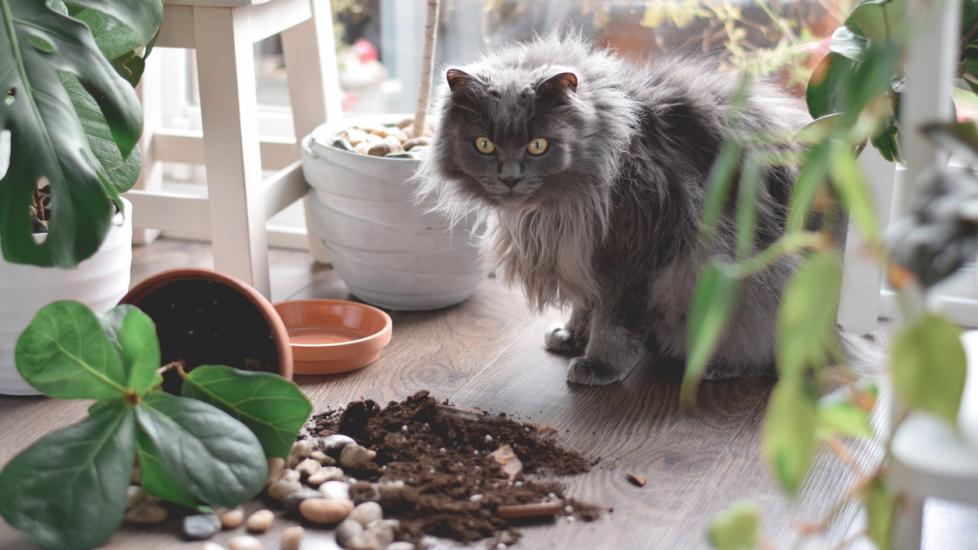Why Do Cats Knock Things Over?
Cat-lovers everywhere know the drill: Their cat is fixated on an object sitting on a counter, table, or desk. After a moment, a paw extends … and the item crashes to the floor as the cat intently watches the action.
This might seem like just another little quirk of our feline friends, but there are logical explanations for why cats knock things over.
Why Do Cats Push Things off Tables?
Cats don’t do things just to do them. There are always reasons for behaviors, and that includes knocking things over.
1. It’s Instinct
As predators, cats are hardwired to be attracted to things that dart past their line of sight. It’s instinctual: Fast-moving objects are potentially something to chase, catch, and eat. The simple act of pushing or batting items off counters and desks plays to this instinct.
2. We’ve Reinforced the Behavior
No one loves their cat spilling a water glass onto the floor. But pet parents might be unknowingly reinforcing that behavior by talking to their cat or picking her up when she goes up to bat. Cats are quick learners; it doesn’t take long for them to figure out that when they begin pushing a glass closer to the table’s edge, their favorite people respond and give them attention.
3. Your Cat Is Bored
Cats who have little stimulation in their environment may find ways to entertain themselves. And when kitties are left alone for hours with nothing to do and no one to interact with, your trinkets will end up on the floor.
How To Stop Your Cat From Knocking Things Over
Before changing her behavior, identify the reasons your cat is knocking things off tables.
-
Look for patterns: When and where does your cat knock things over? Does it usually happen when you’re around? Does your cat act out when you’re not paying attention to her or when she’s hungry?
-
Watch how you respond: Does your kitty get attention when she acts out? Do you feed, pet, or talk to her? Attention can be as subtle as glancing at the cat while she bats stuff off the table. Do you go put the item back on the table (giving her the opportunity to knock it off again)? You may be reinforcing your little attention-seeker’s behavior.
-
Check out your home from the cat’s perspective: Is there high, vertical territory for her to climb? Does she have toys she interacts with? Propelling things off surfaces may be the most exciting activity your bored kitty is doing all day.
Once you understand the whys behind her actions, you can start working to change the behavior.
1. Manage the Environment
Be mindful of where your fragile items live. Instead of placing breakables in spots that are irresistible for your little feline hockey player, stash them in cupboards, cabinets, and areas that she can’t reach.
2. Enrich Her Space
Give your cat stuff to do that’s more fun than knocking things onto the floor. All cats need horizontal scratchers, scratching posts, and lots of toys that are more fun to box and chase than the stuff on your desk.
Tall cat condos and high-up cat shelves encourage cats to climb and exercise, and they’re also ideal places for a catnap. Placing a couple next to windows will keep your feline entertained so she can watch birds and bask in the sun.
3. Watch How You Respond
Don’t accidentally reinforce her behavior with attention when she swats your treasures off the table. Instead, before she jumps on the desk or counter, proactively redirect her attention and give her stimulating things to do.
Throw toys and treats for her to chase. Make her work for her meals by hiding treats and food on her cat trees and in puzzle toys. She needs to have more fun with cat-appropriate toys than she’d have knocking over your water cup or potted plant. Essentially, keep her busy so she doesn’t feel the need to act out.
It’s not uncommon for cats to knock things over. But if that behavior turns into a problem, it’s possible to modify it.
Featured Image: iStock/JulieAlexK
